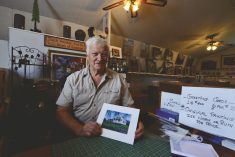With recent increases in land prices, farmers exiting agriculture will realize an influx of cash. But after a lifetime of saving for lean years and re-investing profits back into the farm, some retiring farmers will have difficulty increasing their spending accordingly.
Retirement professionals have a name for this phenomenon. When actual spending is less than what it makes sense to spend, they call it a Retirement Consumption Gap.
Winnipeg psychologist and family wealth consultant Dr. Moira Somers says that after a lifetime watching their pennies, it can be tough for farmers to change their spending habits. “For many people, frugality is more than a habit,” she says. “It’s a value.”
Read Also

When hackers hit the barn
As Canadian farmers embrace automation, cybersecurity is the new front line. Here’s how to protect your on-farm data from digital threats.
That’s not a bad thing, Somers says. It can go too far if you let it interfere with spending on vital things such as medicine and car or house repairs to keep people safe, but you wouldn’t have been as successful in your working years if you didn’t have a cost-control mindset.
Edmonton’s Jim Yih agrees. The founder of the educational financial planning website, Retire Happy, he says you shouldn’t stop being smart about your spending when you retire, and you don’t need to open the floodgates.
“A successful retirement involves having a productive, meaningful, rewarding life and you don’t need millions to do that,” he says.
Somers recommends retiring farmers see the infusion of cash from a farm sale as “a chance to recalibrate, to sit down with your partner, if you have one, and consider, ‘What is possible now?’” She says there are a lot of farm spouses, particularly wives, who have not been in the driver’s seat and now is a good time to ask, “What does my beloved need?”
But before making any financial decisions, she recommends getting “really grounded” in your new financial reality. “Really understand how the money flows in and out of your life now. Figure out what level of spending is possible and desirable.”
That makes sense to Colin Sabourin, a certified financial planner with Trans Canada Wealth Management in Winnipeg who works primarily with farmers. He advises farmers to educate themselves, to find a professional financial advisor they trust, and to ask lots of questions. “Take your time. Do your due diligence. Understand what you’re investing in.”
You’re embarking on a major life transition, Somers says. “It impacts key aspects of your identity, your sense of purpose, your daily activities, your financial situation, and your relationship to money.”
Make a new plan
Retirement coach Ed Zinkiewicz founded the Retirement Kickstart educational website after a 40-year career as a software engineer. “A successful retirement goes beyond money,” says Zinkiewicz, based in Nashville, Tennessee. After retiring, he wrote three books, hosted a 100-episode podcast on volunteering and launched a YouTube channel.
With people living longer, they could be looking at three or more decades of retirement, and it’s important they think in terms of goals. Zinkiewicz prompts his clients to consider the “3 Rs of Retirement” standing for Re-imagine, Re-create, and Re-engage.
Zinkiewicz explains that there are generally three stages of retirement: “Go-Go,” “Slow-Go” and “No-Go.” In the Go-Go stage, he says people have lots of energy and often travel.
This matches Sabourin’s observation that farmers retiring in their late 50s or early 60s seem to have less trouble spending than older retirees because they have better health and more energy.
Retirees enter the Slow-Go stage, says Zinkiewicz, when they experience more health issues and difficulty getting health insurance. It’s also a stage when routines and predictability tend to bring comfort.
Finally, the No-Go stage begins when health has deteriorated to the point of needing assistance with daily living.
Focus on health
Unfortunately, Somers says many of us go into denial about our mortality. This is especially true for “self-employed folks who have no one pushing them out the door,” she says. “Some people stay in the saddle too long,” even when health is declining, which can be dangerous.
Yih says it’s about finding balance. Some people will continue to work part-time and benefit from it, he says. “There’s no one-size-fits-all.”
Zinkiewicz agrees, but stresses that “this is not a time to put your head in the sand” — it’s a time to practice hard conversations about your wishes regarding health care, long-term care and death. He echoes the other advisors’ recommendations to take the opportunity for intentional planning, “something farmers are good at.”
Using the money to invest in your future health boosts happiness, says Somers. As a neuroscientist, she recommends getting “good quality hearing aids that you will use and not leave in the bedside table drawer.” Addressing hearing loss early helps to prevent cognitive decline and to maintain important relationships with the younger people in your life, she says.
Somers also suggests other ways spending can promote health, including purchasing a gym membership and exercise equipment, hiring a personal trainer, going for health checkups, and setting money aside in a health fund.
Turn money into experiences
Money can also be used to create a richer life, Somers says. For instance, use it for experiences such as travel, musical events, study tour, or returning to school.
Another way to look at the financial windfall from selling the farm, suggests Somers, is to consider how the money could benefit those you love as well as the broader community. “One of the ways in which money increases happiness is because it allows us to give it away,” she says.
Through estate planning, you can designate money for the needy or for your heirs, says Somers, who adds that now is the time to decide if there is a message you want to convey with these gifts of money. Yih likes the idea of naming grandchildren in a will; “I think it makes them feel special to be included.”
Or you can begin to transfer wealth to the next generation while you are alive, although the strategy requires some caution, says Yih, because once money has been given, you can’t get it back.
Still, the money can do a lot of good. It could help with the purchase of a house or be used for an experience such as a family vacation (but see a financial advisor to decide if it’s better to give the gift as a lump sum or in trust).
“It’s an opportunity to give to the people you love while you are in a position to watch them benefit,” says Somers. As the saying goes, you can give “with a warm hand instead of a cold one.”
– This article was originally published in the January 2024 issue of Country Guide.
















